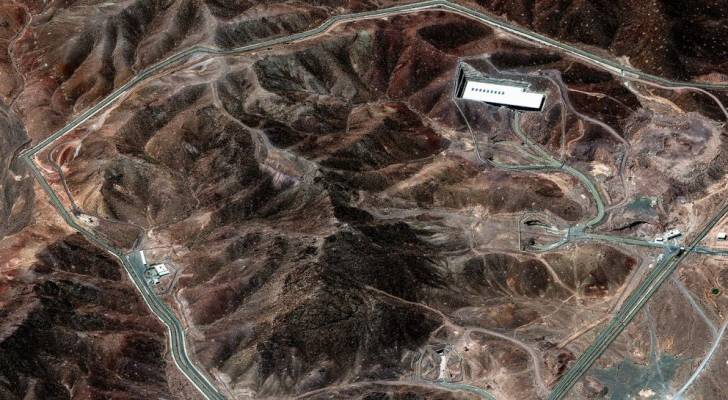Google Earth Image of Fordow nuclear site
Fordow nuclear site: Iran’s most secure secret, daunting target for 'Israel'
The name of Fordow, a city in Iran, has been frequently mentioned following 'Israel’s' attempts to target the Fordow nuclear facility.
The United States has also been urged to supply “bunker-buster” bombs to assist 'Israel' in potentially destroying one of Tehran’s most guarded secrets in its nuclear program.
What we know about Fordow
Nestled deep within Iranian mountains and protected by layers of rock and advanced technology, the Fordow uranium enrichment facility lies about 95 kilometers southwest of Tehran. It is buried roughly half a mile underground inside a military base controlled by the Iranian Revolutionary Guard Corps.
The facility is heavily fortified, protected by advanced air defense systems designed to withstand conventional aerial attacks, making it one of the most secure nuclear sites in Iran. According to the International Atomic Energy Agency (IAEA), Fordow consists of two fortified halls for uranium enrichment housing 16 cascades of centrifuges.
In October 2009, Iran allowed the IAEA to inspect the site for the first time.
US bunker-buster bomb: GBU-57
Fordow’s strategic importance has pushed 'Israel' to consider striking it at all costs, while Washington weighs its options. Among those is deploying the US-exclusive GBU-57 “bunker-buster” bomb — a 30,000-pound munition believed capable of penetrating about 200 feet underground before detonating.
The bomb has a thicker steel casing compared to other bombs and contains less explosive material, designed to survive deep underground penetration. It is praised as the US Air Force’s “jewel” for its long-range, stealthy delivery capabilities.
A recent New York Times report highlighted Fordow as Iran’s most fortified nuclear site. Built deep inside a mountain to prevent attacks, it is only vulnerable to the GBU-57 bomb carried by US B-2 stealth bombers. The bomb’s design allows it to penetrate hardened underground bunkers before exploding.
It is widely believed 'Israel' cannot destroy Fordow by itself. The US has refused to provide 'Israel' with bunker-buster bombs, and Israel lacks heavy bombers capable of delivering them. However, 'Israeli' military officials say targeting nearby power plants that supply electricity to Fordow’s advanced centrifuges could significantly slow down uranium enrichment.
Strategic importance of Fordow in Iran’s nuclear program
Striking Fordow is key to curbing Iran’s nuclear weapons capability. In March 2023, the IAEA revealed that uranium enriched to 83.7 percent purity—near weapons-grade level—was found at Fordow. Iran insists its nuclear technology is for peaceful purposes only.
While the US continues to strengthen its military presence in the Middle East, including refueling and combat aircraft, President Donald Trump maintained a policy of withholding bunker-buster bombs from Israel.
General Joseph Votel, former commander of US Central Command, said the US has deliberately avoided supplying Israel with these weapons to prevent their use.
Washington regards bunker-buster bombs as a critical deterrent and a vital national security asset, not something to encourage an Israeli-Iran war.
Fortification of Fordow: Lessons from history
Iran built Fordow deep underground to avoid the fate of Iraq’s Tammuz reactor, which was destroyed by Israel in 1981 because it was above ground.
'Israel' has developed multiple plans over the years to attack Fordow, including sending commandos by helicopter to sabotage the site—a tactic previously used successfully against a missile facility in Syria linked to Hezbollah.
General Kenneth McKenzie, who succeeded Votel, noted that while Israel has carried out many covert operations recently, Fordow remains an exceptionally difficult target.
'Israeli' Ambassador to the US, Yaheel Leiter, hinted on television that Israel has various options to deal with Fordow, stressing that “not everything depends on taking off and bombing from afar.”




